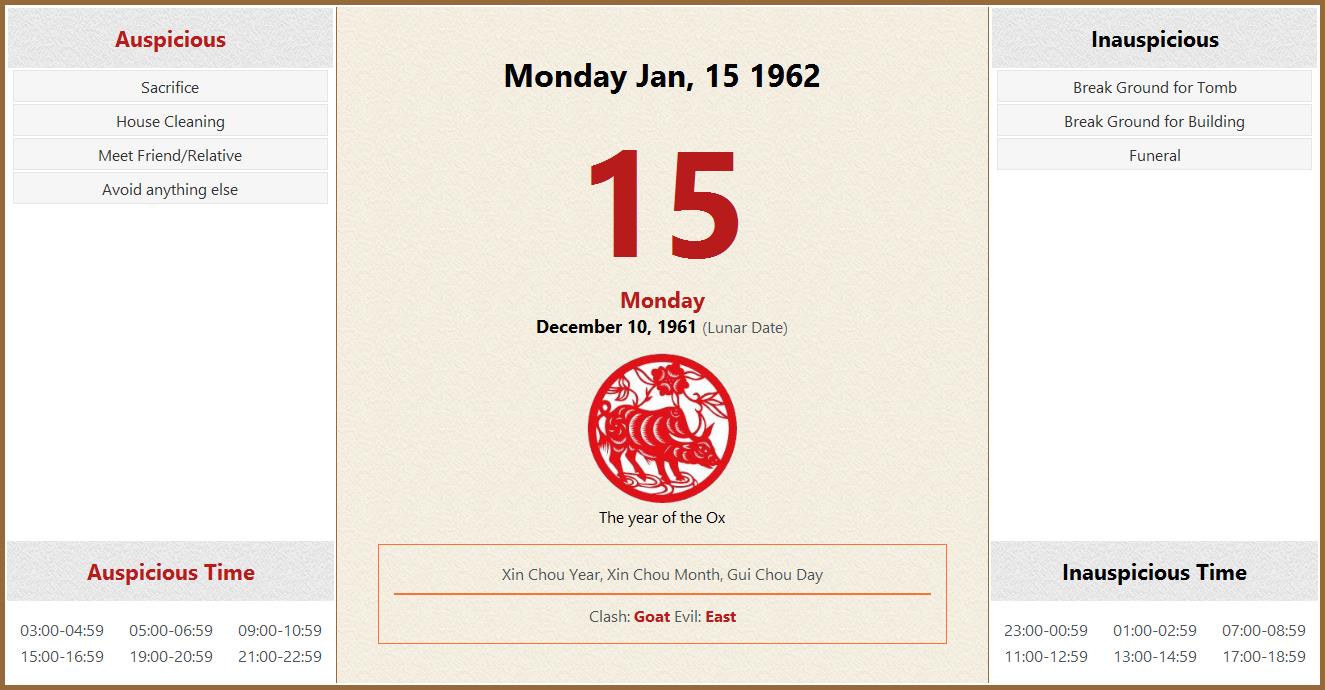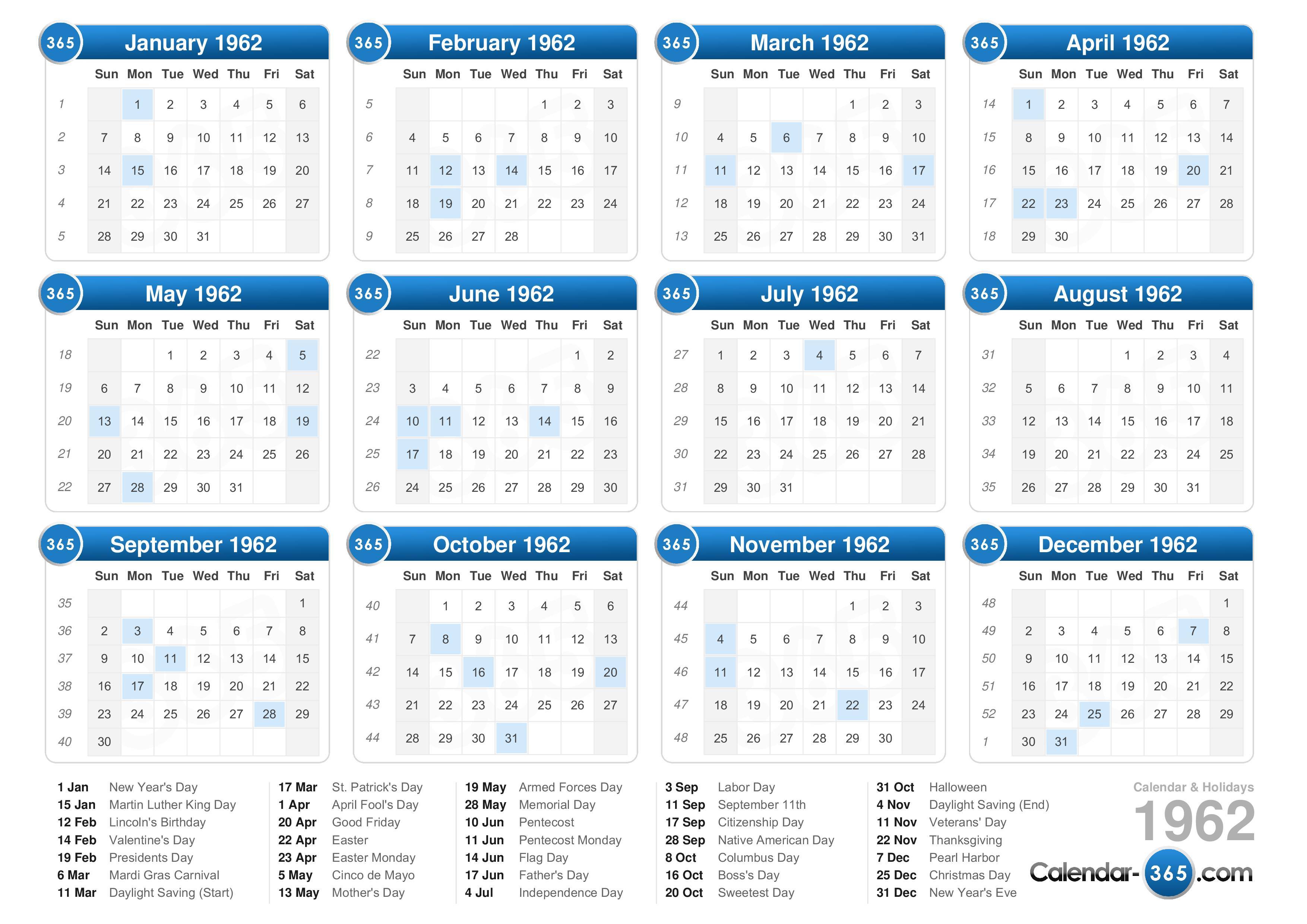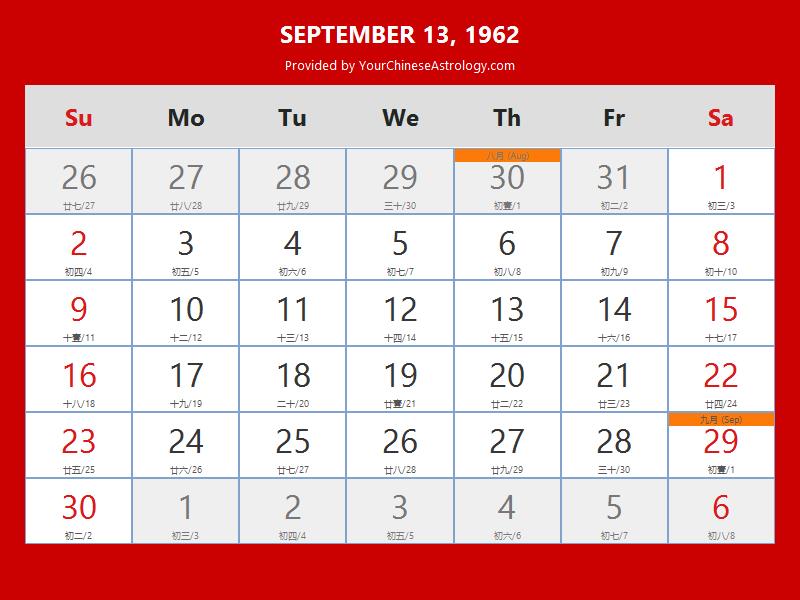Exploring The Chinese Calendar 1962: A Comprehensive Guide
Understanding the Chinese calendar 1962 is essential for anyone interested in astrology, cultural traditions, or historical significance. This ancient calendar system plays a vital role in shaping the way people interpret time and destiny in Chinese culture. By delving into this topic, you will gain valuable insights into how this calendar influences daily life, celebrations, and predictions for the year 1962.
The Chinese calendar is a lunisolar system that has been used for thousands of years. It is not only a tool for tracking time but also a rich source of wisdom that connects humanity to nature and the cosmos. In 1962, this calendar was particularly significant because it marked the Year of the Dog, a year associated with loyalty, honesty, and hard work. These qualities resonate deeply with individuals born during this time.
As we explore the Chinese calendar 1962, we will uncover fascinating details about its structure, symbolism, and influence on modern life. Whether you are seeking personal insight, cultural understanding, or historical knowledge, this guide will provide you with a comprehensive overview of this remarkable calendar system. Let’s dive in and discover the magic of the Chinese calendar 1962!
Read also:Angelina Jolie With Her Brother A Closer Look At Their Bond And Legacy
Table of Contents
- Introduction to the Chinese Calendar 1962
- Structure of the Chinese Calendar
- The Year 1962: A Year of the Dog
- Chinese Astrology and the 1962 Zodiac
- Cultural Significance of the Chinese Calendar
- Historical Context of the Chinese Calendar
- Celebrations and Festivals in 1962
- Astrological Predictions for the Year 1962
- Modern Relevance of the Chinese Calendar
- Conclusion
Introduction to the Chinese Calendar 1962
Understanding the Basics
The Chinese calendar 1962 is a reflection of the ancient wisdom embedded in the lunisolar system. Unlike the Gregorian calendar, which is based solely on the solar year, the Chinese calendar combines lunar cycles and solar movements to create a harmonious system. This integration allows for precise tracking of seasonal changes and astronomical events, making it an invaluable tool for agriculture, astrology, and cultural practices.
Historical Evolution
The origins of the Chinese calendar can be traced back over 4,000 years. It has undergone several modifications throughout history, with each dynasty contributing to its development. By 1962, the calendar had become a well-established system that guided daily life, agriculture, and spiritual practices. Its influence extended beyond China, impacting neighboring cultures and regions.
Structure of the Chinese Calendar
The structure of the Chinese calendar is intricate yet fascinating. It is based on a 60-year cycle, divided into 12-year cycles, each represented by an animal from the Chinese zodiac. These animals, combined with five elements (wood, fire, earth, metal, and water), create a unique combination for each year. In 1962, the combination of the Dog zodiac and the Water element shaped the characteristics of the year.
Key Components
- Lunar months: Each month begins with the new moon and lasts approximately 29.5 days.
- Solar terms: Divides the year into 24 periods based on the sun's position, guiding agricultural activities.
- Zodiac animals: Each year is associated with one of 12 animals, influencing personality traits and destiny.
The Year 1962: A Year of the Dog
In the Chinese calendar 1962, the Year of the Dog was a time of introspection, loyalty, and hard work. People born during this period are believed to possess qualities such as honesty, reliability, and a strong sense of justice. The Water element, which accompanied the Dog zodiac in 1962, added a layer of emotional depth and adaptability to these traits.
Personality Traits
Individuals born in the Year of the Dog are often seen as trustworthy and compassionate. They value integrity and are not afraid to stand up for what they believe in. The Water element enhances their emotional intelligence, making them excellent listeners and empathetic friends. However, they may also be prone to overthinking and skepticism, which can sometimes hinder their progress.
Chinese Astrology and the 1962 Zodiac
The Dog Zodiac
The Dog is the eleventh sign in the Chinese zodiac and is associated with qualities such as loyalty, honesty, and dependability. People born under this sign are often seen as the moral compass of their social circles. In 1962, the Water element added a calming influence, helping Dog individuals navigate challenges with grace and resilience.
Read also:Girls Gone Wild The Untold Story
Compatibility and Relationships
When it comes to relationships, individuals born in the Year of the Dog tend to be loyal partners who prioritize honesty and communication. They are most compatible with those born under the Rabbit or Pig zodiacs, as these signs share similar values and complement their strengths. However, they may face challenges with Rooster individuals, whose direct approach can clash with the Dog's sensitive nature.
Cultural Significance of the Chinese Calendar
The Chinese calendar holds immense cultural significance, serving as a guide for festivals, rituals, and daily life. In 1962, the Year of the Dog was celebrated with traditional customs and ceremonies that honored the qualities associated with this zodiac sign. These celebrations reinforced community bonds and reinforced the values of loyalty and integrity.
Festivals and Traditions
- Chinese New Year: Marked the beginning of the lunar year and was celebrated with fireworks, feasts, and family gatherings.
- Mid-Autumn Festival: Celebrated in September, this festival emphasized unity and gratitude, symbolized by the sharing of mooncakes.
- Qingming Festival: Honored ancestors and emphasized filial piety, a core value in Chinese culture.
Historical Context of the Chinese Calendar
The Chinese calendar has played a crucial role in shaping Chinese history and culture. In 1962, it served as a reminder of the enduring traditions that connected people to their roots. During this period, China was undergoing significant social and economic changes, yet the calendar remained a constant source of guidance and inspiration.
Impact on Society
Throughout history, the Chinese calendar has influenced various aspects of life, from agricultural practices to spiritual beliefs. Its emphasis on harmony and balance resonated deeply with the people of 1962, who faced both challenges and opportunities during this transformative era. The calendar provided a framework for understanding the cyclical nature of life and the importance of adapting to change.
Celebrations and Festivals in 1962
In 1962, the Chinese calendar guided the celebration of numerous festivals that highlighted the rich cultural heritage of China. These events brought communities together and reinforced the values of unity, respect, and gratitude. Each festival was steeped in tradition and symbolism, reflecting the deep connection between the Chinese people and their calendar system.
Key Festivals
- Spring Festival: Celebrated the arrival of spring and symbolized renewal and hope for the coming year.
- Dragon Boat Festival: Honored the patriotic poet Qu Yuan and emphasized the importance of loyalty and courage.
- Double Ninth Festival: Celebrated on the ninth day of the ninth lunar month, this festival promoted respect for elders and appreciation for nature.
Astrological Predictions for the Year 1962
Astrologers in 1962 made several predictions based on the Chinese calendar and the Year of the Dog. They foresaw a year marked by introspection and growth, with individuals focusing on personal development and relationships. The Water element added a layer of emotional depth, encouraging people to confront their fears and embrace change with courage.
Challenges and Opportunities
While the Year of the Dog was expected to bring challenges, it also offered numerous opportunities for growth and transformation. Individuals were encouraged to cultivate resilience and adaptability, qualities that would serve them well in navigating the complexities of life. The predictions emphasized the importance of staying true to one's values and maintaining a sense of balance and harmony.
Modern Relevance of the Chinese Calendar
Today, the Chinese calendar continues to hold relevance in both traditional and modern contexts. It is celebrated worldwide during the Lunar New Year and serves as a source of inspiration for those seeking guidance in their personal and professional lives. The principles of harmony, balance, and cyclical change resonate with people from all walks of life, making the Chinese calendar a timeless treasure.
Integration with Modern Life
In the digital age, the Chinese calendar has found new ways to connect with people through apps, online resources, and social media platforms. These tools make it easier for individuals to access information about zodiac signs, auspicious dates, and cultural traditions. The calendar's enduring appeal lies in its ability to provide context and meaning to life's complexities.
Conclusion
In conclusion, the Chinese calendar 1962 offers a fascinating glimpse into the rich tapestry of Chinese culture and astrology. By exploring its structure, symbolism, and influence, we gain a deeper understanding of how this ancient system continues to shape modern life. Whether you are seeking personal insight, cultural knowledge, or historical context, the Chinese calendar provides invaluable wisdom for navigating the complexities of the world.
We invite you to share your thoughts and experiences in the comments below. How has the Chinese calendar influenced your life? What insights have you gained from studying the Year of the Dog? Don’t forget to explore other articles on our site for more fascinating information about astrology, culture, and history.



